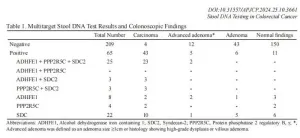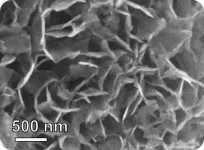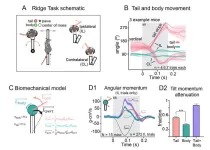(Press-News.org) A recent prospective cross-sectional study in Thailand demonstrates that multitarget stool DNA testing is highly sensitive and specific for detecting colorectal cancer (CRC) among Thai individuals. Researchers believe that this testing method could serve as a viable non-invasive alternative to colonoscopy, especially in settings where colonoscopy is less accessible or less accepted by patients.
This study was conducted by BGI Genomics in 2023, in collaboration with Professor Varut Lohsiriwat’s team from the Faculty of Medicine, Siriraj Hospital, Mahidol University, Thailand. The research team included Professor Varut Lohsiriwat, Dr. Aitsariya Mongkhonsupphawan (M.D, Ph.D, Faculty of Medicine, Siriraj Hospital, Mahidol University), and Pornraksa Ovartchaiyapong (Lecturer, Faculty of Medicine, Siriraj Hospital, Mahidol University). The study was published in the Asian Pacific Journal of Cancer Prevention (APJCP) in October 2024.
Researchers focused on evaluating the diagnostic performance of the multitarget stool DNA testing for detecting CRC and advanced adenoma, using colonoscopy as the reference standard. The study included both asymptomatic and symptomatic patients who underwent stool DNA testing followed by colonoscopy. The multitarget stool DNA test targeted methylation statuses of SDC2, ADHFE1, and PPP2R5C genes. Sensitivity, specificity, and other diagnostic parameters were analyzed.
In the study, data from 274 patients (mean age 62 years, with a predominantly female cohort at 60.6%) were evaluated. Colorectal cancer was identified in 17.2% of participants, while 6.2% were found to have advanced adenomas, which are precursors to cancer. The multitarget stool DNA test, a non-invasive screening method, yielded impressive results: it detected CRC with a sensitivity of 91.5% and a specificity of 90.3%, accurately identifying cancer in over 90% of cases. The test's sensitivity was consistent across both right-sided and left-sided colon lesions, at 92.3% and 91.2%, respectively.
For advanced colorectal neoplasms, which include both CRC and advanced adenomas, the test demonstrated a sensitivity of 75% and a specificity of 91.9%, marking it as a promising tool for the early detection of serious colorectal conditions. These findings highlight the test's potential as an effective screening option for detecting CRC, especially for larger lesions, although some limitations remain for detecting smaller-sized abnormalities.
BGI Genomics’ COLOTECT® stool DNA testing kits were used for sample and raw data collection. COLOTECT® is a non-invasive tool for early colorectal cancer detection based on DNA methylation testing, targeting the methylation profile of colorectal exfoliated cells to assess the risk of colorectal cancer and advanced adenomas. This tool requires no special equipment, imposes no dietary restrictions, and is entirely non-invasive. In recent years, DNA methylation-based colorectal cancer detection has gained recognition, being incorporated into multiple CRC screening guidelines and expert consensus worldwide.
The study results indicate that multitarget stool DNA testing is highly sensitive and specific for CRC detection among Thai individuals. This testing could provide a viable non-invasive alternative to colonoscopy, especially in settings where colonoscopy is less accessible or less accepted by patients.
In June 2024, to advance the global understanding of CRC and explore ways to close the awareness gap, BGI Genomics invited Prof. Varut Lohsiriwat from Mahidol University and Dr. Zhu Shida from BGI Genomics to share insights after reviewing the BGI Genomics 2024 Global State of Colorectal Cancer Awareness Report.
As early as 2022, BGI Genomics Southeast Asia team established a close partnership with Professor Varut Lohsiriwat from the Faculty of Medicine, Siriraj Hospital, Mahidol University, inviting him to participate in the BGI Genomics overseas science education program “Your Health, Our Concern.” In this program, Professor Lohsiriwat shared valuable knowledge and insights on colorectal cancer treatment.
With support from global experts, such as Professor Varut’s team, and advanced genetic sequencing technology like BGI Genomics’ COLOTECT® Stool DNA Methylation Test, which extracts DNA from intestinal exfoliated cells in stool samples and detects aberrant methylation in genes related to CRC (SDC2, ADHFE1, and PPP2R5C) through fluorescent PCR, we expect to significantly reduce the global burden of CRC.
About COLOTECT®
COLOTECT® is a non-invasive fecal DNA test developed by BGI Genomics for detecting CRC and precancerous lesions. It uses multiplex methylation-specific PCR (MSP) technology to trace abnormal DNA-methylation biomarkers in CRC from stool samples. COLOTECT® has a sensitivity of 88% for detecting CRC, and a sensitivity of 46% for the early detection of advanced adenomas—both of which outperform conventional fecal tests.
About BGI Genomics
BGI Genomics, headquartered in Shenzhen, China, is the world's leading integrated solutions provider of precision medicine. Our services cover more than 100 countries and regions, involving more than 2,300 medical institutions. In July 2017, as a subsidiary of BGI Group, BGI Genomics (300676.SZ) was officially listed on the Shenzhen Stock Exchange.
END
Research proves stool DNA as non-invasive alternative for colorectal cancer screening in Thailand
2024-11-06
ELSE PRESS RELEASES FROM THIS DATE:
Detecting evidence of lung cancer in exhaled breath
2024-11-06
Exhaled breath contains chemical clues to what’s going on inside the body, including diseases like lung cancer. And devising ways to sense these compounds could help doctors provide early diagnoses — and improve patients’ prospects. In a study in ACS Sensors, researchers report developing ultrasensitive, nanoscale sensors that in small-scale tests distinguished a key change in the chemistry of the breath of people with lung cancer. November is Lung Cancer Awareness Month.
People breathe out many gases, such as water vapor and carbon dioxide, as well as other airborne compounds. Researchers ...
A joint research team of Korea University College of Medicine announced the world's first single-port robotic thymectomy comparative results
2024-11-06
A Joint research team (Prof. Jun-hee Lee, Hyun-koo Kim, Jin-Wook Hwang, Jae-Ho Chung, the Department of Thoracic and Cardiovascular Surgery, Korea University College of Medicine) Announced the world's first compartive results of single-port robotic thymectomy using the single-port robotic system.
The team compared and analyzed the perioperative outcomes of 110 cases of robotic thymectomy using the single-port robotic system and conventional video-assisted thoracic surgery(VATS) thymectomy from November 2018 to May 2024. The results showed that all robotic thymectomy performed were successfully ...
National Mental Health Institute awards CAD 45 million to develop mental health treatments
2024-11-06
One out of 100 people will experience a psychotic episode in their lifetime, and these usually appear in late adolescence or early adulthood. A Canada-US team consisting of Sylvain Bouix, from École de technologie supérieure (ÉTS), Martha E. Shenton and Ofer Pasternak, from the Brigham and Women’s Hospital (Harvard University), and René Kahn, from Mount Sinai Hospital (New York) has just received US $33 million in funding—the equivalent of CAD 45 million—over five years from the National Institute of Mental Health ...
Washington coast avian flu outbreak devastated Caspian terns, jumped to seals
2024-11-06
PULLMAN, Wash. – An epidemiological study found that 56% of a large breeding colony of Caspian terns died from a 2023 outbreak of highly pathogenic avian influenza at Rat Island in Washington state. Since then, no birds have successfully bred on the island, raising concerns that the outbreak may have had a significant impact on an already declining Pacific-coast population.
As part of the study, a team including Washington Department of Fish and Wildlife (WDFW) as well as Washington State University researchers also documented that the avian flu virus H5N1was transmitted to harbor seals for the first time in the northeastern ...
Mice tails whip up new insights into balance and neurodegenerative disease research
2024-11-06
Why do mice have tails?
The answer to this is not as simple as you might think. New research from the Okinawa Institute of Science and Technology (OIST) has shown that there’s more to the humble mouse tail than previously assumed. Using a novel experimental setup involving a tilting platform, high-speed videography and mathematical modelling, scientists have demonstrated how mice swing their tails like a whip to maintain balance – and these findings can help us better understand balance issues in humans, paving the way for spotting and treating neurodegenerative diseases like multiple ...
New study: Earthquake prediction techniques lend quick insight into strength, reliability of materials
2024-11-06
CHAMPAIGN, Ill. — Materials scientists can now use insight from a very common mineral and well-established earthquake and avalanche statistics to quantify how hostile environmental interactions may impact the degradation and failure of materials used for advanced solar panels, geological carbon sequestration and infrastructure such as buildings, roads and bridges.
The new study, led by the University of Illinois Urbana-Champaign in collaboration with Sandia National Laboratories and Bucknell University, shows that the amount ...
Vitamin D during pregnancy boosts children’s bone health even at age seven
2024-11-06
Vitamin D during pregnancy boosts children’s bone health even at age seven
Children whose mothers took extra vitamin D during pregnancy continue to have stronger bones at age seven, according to new research led by the University of Southampton and University Hospital Southampton (UHS).
Bone density scans revealed that children born to mothers who were given vitamin D supplements during pregnancy have greater bone mineral density in mid-childhood. Their bones contain more calcium and other minerals, making them stronger and less likely to break.
Researchers say the findings, published in The American Journal of Clinical Nutrition, reinforce the importance of ...
Use of “genetic scissors” carries risks
2024-11-06
The CRISPR molecular scissors have the potential to revolutionize the treatment of genetic diseases. This is because they can be used to correct specific defective sections of the genome. Unfortunately, however, there is a catch: under certain conditions, the repair can lead to new genetic defects – as in the case of chronic granulomatous disease. This was reported by a team of basic researchers and physicians from the clinical research program ImmuGene at the University of Zurich (UZH).
Chronic granulomatous disease is ...
Does work-related stress compromise cardiovascular health?
2024-11-06
In a large multi-ethnic group of adults in the United States without cardiovascular disease, those with work-related stress were more likely to have unfavorable measures of cardiovascular health. The findings are published in the Journal of the American Heart Association.
For the analysis, investigators assessed data collected between 2000 and 2002 for 3,579 community-based men and women aged 45–84 years enrolled in the Multi-Ethnic Study of Atherosclerosis. Cardiovascular health was determined based on seven metrics—smoking, physical activity, body mass index, diet, total cholesterol, blood pressure, and blood glucose—with each metric contributing zero points, ...
New research may lead to potatoes that are less reliant on nitrogen fertilizers
2024-11-06
Because nitrogen fertilizers contribute to global greenhouse gas emissions, scientists are looking for ways to modify agricultural plants so that they rely on less nitrogen. In research published in New Phytologist, investigators have found that blocking a particular protein may achieve this goal in potatoes.
The protein, called Solanum tuberosum CYCLING DOF FACTOR 1 (StCDF1), binds to DNA and plays a key role in regulating tuberization in potatoes. In this latest research, investigators found that StCDF1 ...






